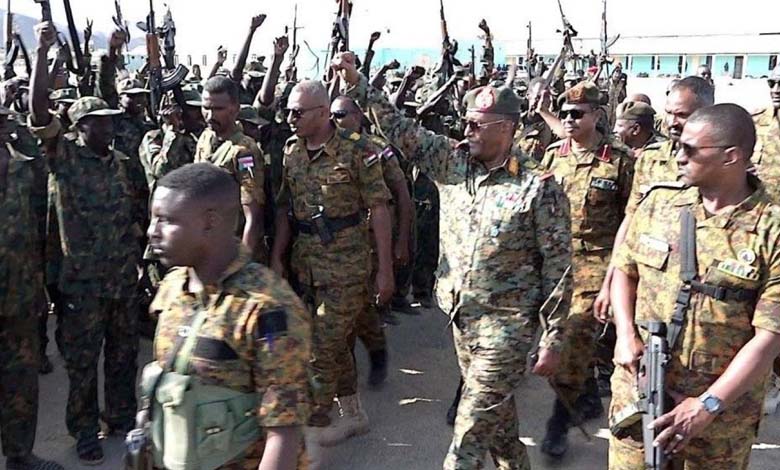From Iraq and Lebanon to Yemen and then Sudan… Al-Burhan Tilts Iran Militias in Africa

Iran is exerting pressure on Sudanese authorities to allow for the establishment of a permanent Iranian naval base on the shores of the Red Sea. However, these demands have been met with rejection from Khartoum, which fears escalating hostility from the United States and Israel. Nonetheless, Sudanese army commander Abdul Fattah al-Burhan shows interest in equipping his forces and maintaining friendly relations with Iran, which seeks to establish a permanent presence in Sudan, as revealed by reports from The Wall Street Journal.
Iran Establishes New Footprint in Sudan
The presence of a naval base on the Red Sea would allow Tehran to tighten its grip on one of the world’s busiest shipping lanes, where the Houthis help carry out attacks on commercial vessels.
A senior Sudanese intelligence official, quoted by the American newspaper, said that an Iranian base in the Red Sea would give Iran an advantage in monitoring maritime traffic to and from the Suez Canal, as well as for Israel. Iran’s arming of the Sudanese army prolongs the duration of fighting and reduces the likelihood of finding a way out of the conflict through negotiations.
Ahmed Hassan Mohammed, intelligence adviser to Sudanese army commander Abdul Fattah al-Burhan, said Iran had provided the Sudanese army with explosive drones for use in combat against the Rapid Support Forces led by Mohammed Hamdan Dagalo “Hemiti.” Iran also offered to provide a warship carrying a helicopter if Sudan allowed the construction of the base.
Using the Base for Intelligence Gathering
The same official added, “The Iranians said they wanted to use the base for intelligence gathering.” And he continued, “They also wanted to station warships there.” However, he emphasized that Khartoum rejected the Iranian proposal to avoid provoking hostility from the United States and Israel.
Sudan maintained strong relations with Iran and Hamas during the era of Bashir. After his ousting in 2019, army chief Abdul Fattah al-Burhan began seeking rapprochement with the United States to end international sanctions against his country, as well as moving towards normalizing relations with Israel.
The Sudanese army has been fighting the Rapid Support Forces since mid-April. The conflict has led to the deaths of tens of thousands of people, displacement of millions more, and caused one of the worst humanitarian crises in the world.
The American newspaper cited the Sudanese intelligence official saying, “Sudan bought explosive drones from Iran because we needed more precise weapons to reduce loss of human lives and respect international humanitarian law.”
According to regional and local officials, explosive drones provided by Iran have helped the Sudanese army compensate for its losses against the Rapid Support Forces. The army has regained control of areas in Khartoum and Omdurman.
Sudan: Iran’s New Proxy in Africa
Iran aims, through arming the Sudanese army, to bolster its military influence in the Middle East, as it supports armed groups in Gaza, Hezbollah in Lebanon, the Houthis in Yemen, as well as groups in Syria and Iraq.
United Nations officials have criticized Sudan for its aerial bombardment of civilian neighborhoods and the denial of humanitarian aid to Sudanese civilians in dire need.
Last February, the United States expressed concern about Iranian arms shipments to the Sudanese army. John Godfrey, the U.S. ambassador to Sudan at the time, said reports of Iranian assistance to Khartoum were “extremely troubling and a significant concern for us.” He told journalists, “There are reports of a resumption of relations between Sudan and Iran that may include Iranian financial support for the Sudanese army, which is of great concern to us.”
Godfrey pointed out that the United States “urged external parties to refrain from providing financial support to the warring parties” without naming them. He explained that this “prolongs the fighting and reduces the likelihood of finding a way out of the conflict through negotiations.”
Last month, the Rapid Support Forces posted on social media what they claimed was wreckage of an Iranian-made “Mohajer” drone belonging to the army. Bloomberg News also reported, citing Western officials, that Iran was supplying the Sudanese army with weapons.
Wim Zwijnenburg, head of the disarmament project at the Dutch organization PAX, confirmed that among the evidence proving the presence of the Mohajer 6 in Sudan are satellite images taken on January 9th of the drone at Wadi Sayyidna Air Base (under army control) north of Khartoum.
Zwijnenburg also identified a wireless antenna above a control center inside a truck at the airstrip of the Wadi Sayyidna base, as additional evidence of the operation of the drone. According to U.S. officials, the “Mohajer 6” is capable of conducting air-to-ground attacks, electronic warfare, and targeting on the battlefield.
Under the former president Omar al-Bashir, who was ousted in 2019, Sudan developed close relations with Iran. With the Sudanese army controlling areas along the Red Sea, the widespread presence of Iran would raise concerns among Western powers, as Houthi rebels in Yemen target international shipping vessels on the other side of the strategic maritime corridor in solidarity with Palestinians in Gaza.
Thousands have been killed since the outbreak of the war between the Sudanese army and the Rapid Support Forces in April last year.












